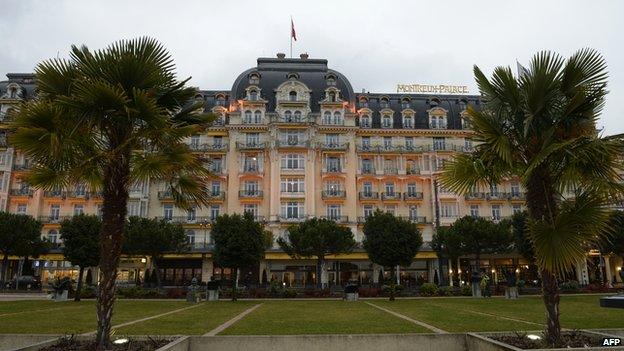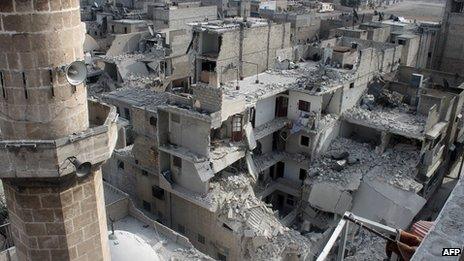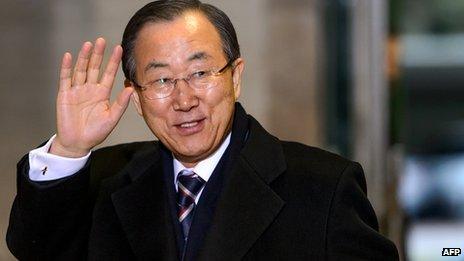Are Geneva ll talks a start for Syria?
- Published

The Montreux-Palace hotel will host the start of the peace talks
Montreux is about to find its place in history.
One of the claims to fame of this idyllic Swiss city is that it provided one of the settings in Ernest Hemingway's acclaimed novel A Farewell to Arms.
No one has any illusions Syria's warring parties will put down their guns anytime soon in peace talks set to be launched there on Wednesday.
Montreux will only mark the ceremonial start. Representatives of dozens of invited nations will sit down with prepared speeches certain to exhort fighters on all sides to end the profound suffering of their people and find a negotiated way out of this deepening crisis.
Then, on Friday, when delegates to a luxury watch fair leave their Geneva hotels, Syrian delegations will move there to begin negotiations in a process mediated by UN envoy Lakhdar Brahimi. That is, unless the process collapses from the start in Montreux.
"We really don't know what will happen," admitted one official involved in the preparations.
But, in the absence of any other strategy, it's become the only game in town, at least for some of the key players.
'Everyone is hurting'

Aleppo, Syria's largest city, has been badly damaged by the fighting
"We need to try this since there is nothing better on the horizon," was how one Western diplomat described the historic gathering known as Geneva ll.
"Everyone is hurting," he regretted in a compact summary of a war that is said to have already taken at least 130,000 lives and left large swathes of Syria in utter ruin.
But the warring sides are not ready to talk.
For months, opposition leaders have complained they were being pushed towards the negotiating table. George Sabra, whose Syrian National Council refused to take part in the talks, told me the pressure was "shameful".
And the Syrian government kept saying it was ready to go. "We are ready, yesterday, today, tomorrow, we are prepared," was how Syria's Deputy Foreign Minister Faisal Mekdad put it to me in an interview in Damascus in late December.
But talk to any of President Assad's supporters and they will tell you these talks are about "fighting terrorism" of Syria's Islamist groups, not the "transition" set out in the Geneva l document that underpins this process.
In the final countdown, the war of words intensified.
Disarray
The head of the main National Coalition for Syrian Revolutionary and Opposition Forces, Ahmad Jarba made it clear "the negotiating table for us is a track toward achieving the demands of the 'revolution' - at the top of them removing the butcher from power".

The UN's Ban Ki-moon has appealed for all sides to end the suffering of the Syrian people
But President Assad spoke again of the "significant" chance he will seek a new term, and contemptuously dismissed the opposition as puppets of foreign powers.
"They were created during the crisis by foreign intelligence agencies whether in Qatar, Saudi Arabia, France, the United States or other countries," he told the French news agency AFP.
Among Syrians, and their foreign backers, there is disarray, disagreement and doubt.
The 11th-hour invitation to Iran - one of President Assad's key backers - by the United Nations, and then the removal of that invitation, was a diplomatic debacle over a war that is no longer just about Syria.
Behind the scenes, wrangling among major players and payers like Saudi Arabia and Qatar played out in a political tug of war involving the array of opposition factions.
The slim thread that keeps this process going is the hope that, over time, a negotiated escape from a devastating war will eventually emerge. But it will be years in the making.
'Signed with blood'
One of the oft-cited lessons from Northern Ireland's talks is the need for a recognition from all sides that they cannot win by military means. Syria's warriors aren't exhausted yet.
One of the many armed groups now fighting on the ground, and fighting among themselves, is the recently created Islamic Front.
One of its leading members, Abu Omar, wrote on his Twitter account that Syria's future would be "formulated here on the ground of heroism, and signed with blood on the front lines, not in hollow conferences attended by those who don't even represent themselves".
The Syrian opposition coalition that reluctantly agreed to sit at the table fears Montreux will simply be a photo-opportunity that will further undermine their already tenuous legitimacy.
As he set out for Montreux, the UN Secretary-General Ban Ki-moon made a last appeal.
"I especially appeal to the Syrian parties themselves to keep one goal in mind - the end of the suffering of the Syrian people and the beginning of a transition to a new Syria," he said.
Everyone fears the end of this tragedy is nowhere in sight. But there is a fervent hope, most of all among Syrians, that this week could, at the very least, signal the beginning of the end.
